Super Bowl scandals: Chiefs and 49ers aim to avoid Las Vegas’ temptations and the infamous prostitution arrest, drug use, and other pitfalls that doomed NFL teams’ title hopes
The NFL’s first Super Bowl in Las Vegas brings its own set of challenges, most of which can be gleaned from its “Sin City” reputation.
The league no longer tests for marijuana, so Kansas City Chiefs and San Francisco 49ers players looking to indulge in pot-legal Nevada won’t have any problems there.
But Vegas has no shortage of other vices that could put Super Bowl LVIII participants in legal or professional jeopardy, which is why both teams are staying in Henderson — about 25 miles from the Vegas Strip.
As expected, the temptation to gamble is strictly prohibited by the league, as Jeff Miller, the NFL’s executive vice president of communications, public affairs and policy, recently told reporters on a conference call: “The rules are no different for the players of the participating teams and other players. staff as they would be at any other game. When you’re on a business trip, there’s no gambling involved, whether it’s sports gambling or otherwise.”
There’s also the lure of hard drugs in Las Vegas, which has a higher rate of cocaine use than all but four other major U.S. cities, according to American Addiction Centers.
The Kansas City Chiefs and San Francisco 49ers will descend on Las Vegas for the Super Bowl
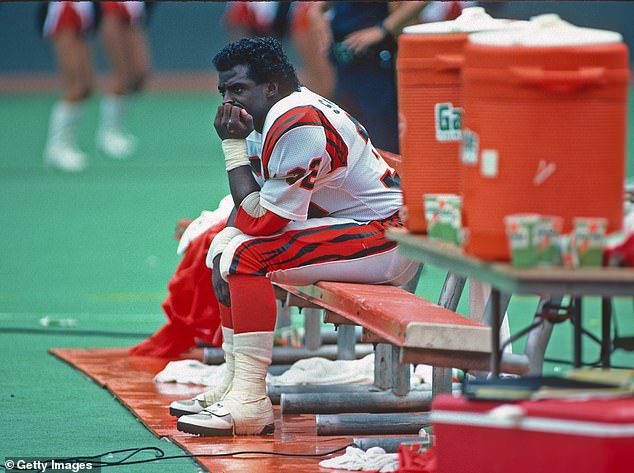
Bengals running back Stanley Wilson contributed in 1988 before missing the Super Bowl
Additionally, the Las Vegas area has a reputation for prostitution (the practice is semi-legal in Nevada, but not in Clark County, where the teams reside).
And according to the Department of Health and Human Services, the city ranks seventh among all major U.S. cities in access to mental health care — medical conditions that can be exacerbated by gambling, alcohol use and prostitution, according to the Journal of Urban. Design and mental health.
Combined with the pressure to perform on the NFL’s biggest stage, players face bigger potential pitfalls than ever in their careers. That’s why Mail Sport looks back at three cautionary tales from past Super Bowls:
STANLEY WILSON
Facing Joe Montana and the two-time Super Bowl champion 49ers, the upstart Cincinnati Bengals boasted one of the NFL’s best offenses in 1988 en route to Super Bowl XXIII in Miami.
Led by MVP Boomer Esiason and Hall-of-Fame left tackle Anthony Munoz, the Bengals paired an elite passing attack with one of the best ground games in football. Fullback Ickey Woods was the fan favorite for his famous touchdown dance, the Icky Shuffle, but veteran James Brooks also had 1,218 total yards this year.
Also in the picture was Stanley Wilson – a promising rookie from Oklahoma in 1983 whose career had been turned upside down by two substance abuse suspensions.
After missing the 1985 and 1987 campaigns entirely, the 27-year-old Wilson was back in 1988, where he proved to be a solid backup option for both Woods and Brooks.
He was expected to contribute to the Bengals’ Super Bowl effort in January 1989, until he was mysteriously absent from a meeting at the team hotel in Plantation, Florida on the eve of the big game.
The bathroom door of his hotel room was eventually thrown open, revealing an embarrassed Wilson sitting on the edge of a bathtub and smoking crack cocaine.
“We had taken a walk on the playing field, he had his wife there, his mother and his father,” head coach Sam Wyche told Cincinnati’s ABC affiliate in 2015. “He flew them in from California. There was no sign of a problem.’
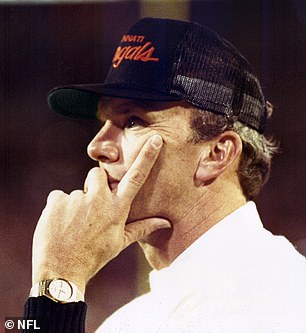
The late Sam Wyche later said he thought the Bengals would have won if they had had Stanley Wilson against the 49ers in Super Bowl XXIII
The impact on the team was immediate.
“It really was like the ceiling collapsed,” Bengals receiver Cris Collinsworth said in an interview at the time.
Veteran linebacker Reggie Williams said there was “a lot of pain, a lot of frustration.”
Wyche made the difficult decision to suspend Wilson for the match; a decision he later admitted could have cost Cincinnati a win.
“I remember the grass wasn’t watered properly and it came up in patches,” Wyche said in 2015, five years before his death. “Ickey Woods, Stanford Jennings and James Brooks were all tall, hunched-over runners, and when they did that, the surface loosened. But Stanley was quite a big mover, a sort of Barry Sanders runner, and he would miss people.
“I believe in my heart of hearts that if we had had him in that ball game, we would have won that ball game when we were gone. It wouldn’t have been a close game.”
Of course the match was close, very close.
The Bengals nearly pulled off an upset before Cincinnati cornerback Lewis Billups dropped a potential game-winning interception in the end zone and Montana followed with a touchdown pass to John Taylor with 34 seconds left to seal the 20-16 victory.
Wilson would never play in another NFL game, although his son and namesake eventually played cornerback at Sanford before being drafted by the Detroit Lions in 2005.
Sadly, Wilson Jr. died. of pulmonary thromboembolism after collapsing in Los Angeles a year ago.
EUGENE ROBINSON
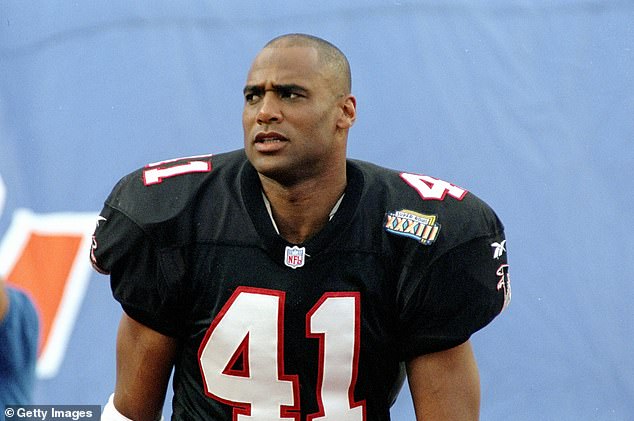
The Falcons’ Eugene Robinson stands on the sidelines and watches during Super Bowl XXXIII
Already a Super Bowl champion as a member of the 1996 Green Bay Packers, Eugene Robinson joined the Atlanta Falcons in 1998 and helped revive a secondary still recovering from the loss of cornerback Deion Sanders four years earlier.
His impact was immediate and with four interceptions on the season, he helped lead Atlanta to its first Super Bowl berth in January 1999.
The only thing more impressive than his play on the field was the way the veteran defensive back carried himself away from the game.
On the eve of Super Bowl XXXIII, Robinson was even honored with the Bart Starr Award, given to the NFL player who “best exemplifies outstanding character and leadership at home, on the field and in the community.”
He then offered an undercover officer $40 for oral sex.
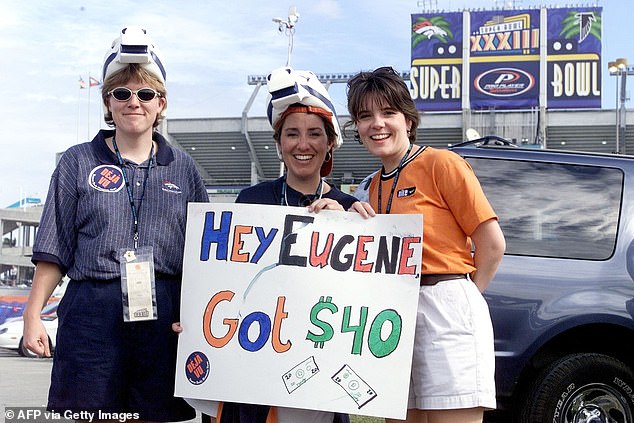
Some Broncos fans poked fun at Robinson after his arrest for solicitation
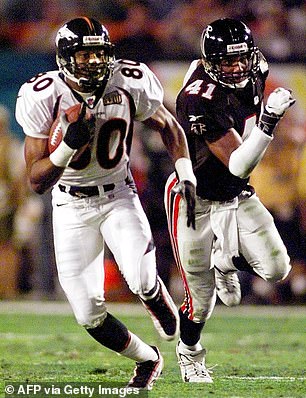
Robinson (right) yielded an 80-yard touchdown to receiver Rod Smith (left), later missing a tackle that allowed running back Terrell Davis to make a long run
Robinson’s arrest in Miami led to a national media story before the Super Bowl.
According to reports at the time, Robinson was driving alone in a rented vehicle when he approached the undercover officer, posing as a prostitute, and allegedly offered $40.
He was arrested, released and allowed to participate in the game, but Robinson’s troubles were just beginning.
Against the favored Denver Broncos, a sleep-deprived Robinson set up an 80-yard touchdown to receiver Rod Smith, later missing a tackle that allowed running back Terrell Davis to advance the ball to the Atlanta 10-yard line.
The Falcons lost 34–19, and Robinson subsequently returned the Bart Starr Award.
He ended his career with the Carolina Panthers in 2000 and later became a radio analyst for the team.
Interestingly enough, Robinson was asked to address the Carolina locker room prior to Super Bowl 50, and although the Panthers would ultimately lose to the Broncos, many players remember the game for its powerful message.
“Guys, you have a great opportunity,” Robinson told the Panthers players. “Go ahead and seize the moment. Don’t be like me.’
BARRET ROBBINS
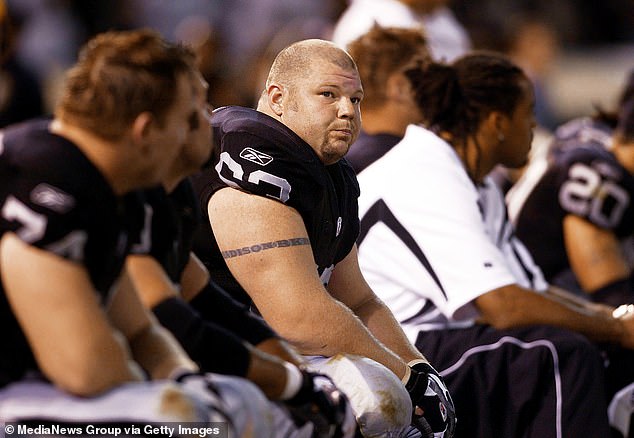
Oakland Raiders’ Barret Robbins went missing prior to Super Bowl XXXVII in San Diego
The NFL is more aware of mental health issues these days, but prior to Super Bowl XXXVII in January 2003, there was less concern about the issue.
So when Oakland Raiders center Barret Robbins went missing days before facing the Tampa Bay Buccaneers in the big game, public opinion was decidedly against the All-Pro offensive lineman, who many thought was on the wrong track put.
Robbins was “incoherent” when he resurfaced prior to the Super Bowl, according to then-Raiders head coach Bill Callahan, who fired his starting center over the objections of longtime team owner and general manager Al Davis.
One teammate even claimed that Robbins did not recognize Callahan upon his return to the team.
It wasn’t until the Raiders’ 48-21 loss that the circumstances of Robbins’ absence began to leak.
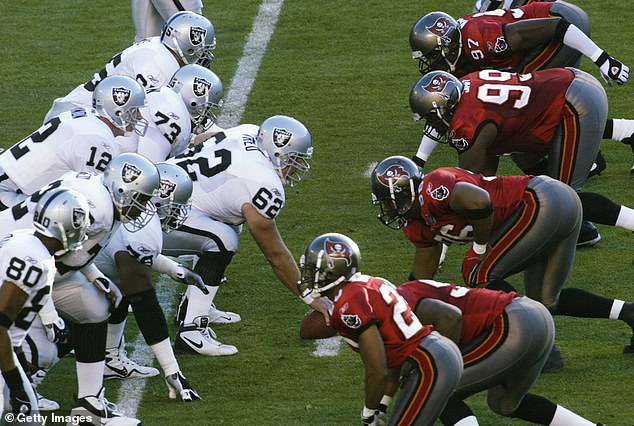
Without Robbins, an All-Pro in 2002, the Raiders went with backup Adam Treu against the Bucs
Robbins had been drinking across the border in Tijuana, according to his wife, but only after he stopped taking his prescription medications.
He would subsequently spend 30 days at the Betty Ford Center, where he was diagnosed with bipolar, but the Raiders and the NFL would turn their backs on Robbins in 2003 amid allegations of performance-enhancing drug use.
Since then, Robbins has been in and out of jail for various offenses. He was shot three times during a brawl with police, survived, returned to several treatment centers and later admitted to regular cocaine and steroid use.
He was last arrested in 2022 in Florida, where police said he often slept outside a local supermarket.
